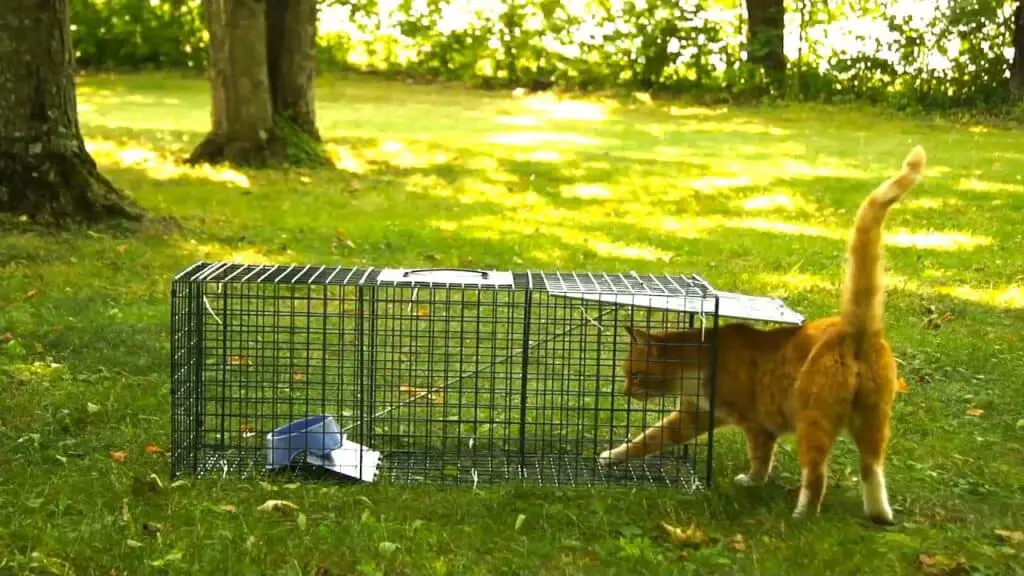Welcome to our expert guide on trapping raccoons while safeguarding cats. Discover effective strategies to ensure the safety of felines during raccoon trapping.
In this comprehensive guide, we’ll walk you through proven methods and tips to trap raccoons without harm to your beloved feline companions.
Learn how to coexist peacefully with wildlife while protecting your pets. So let’s start!
Trapping Raccoons Safely Without Harming Your Cats

Trapping raccoons without accidentally catching cats can pose a challenge, but there are effective strategies to achieve this. Consider these tips:
- Use live traps: Opt for cage-type live traps instead of foot hold or body gripping traps. This allows you to release barn cats unharmed if they enter the trap.
- Keep cats well-fed: Ensure your barn cats are well-fed when trapping raccoons in their territory. Hungry cats are more likely to interfere with your trapping efforts.
- Select cat-resistant bait: Choose baits that are less attractive to cats, like sardines in oil, wet cat food, or mealworm and bug-based blends. Avoid fish-based bait, as it attracts barn cats.
- Strategic trap placement: Position the trap in a location less accessible to cats, such as on a roof or in a tree.
- Regular trap checks: Be diligent about checking your traps frequently and releasing non-target animals unharmed.
If you’re uncertain about trapping raccoons without catching cats, consider enlisting the assistance of a professional wildlife removal service.
Alternatively, you can refer to our comprehensive guide on ‘How to get rid of Raccoons.’
Alternatives to Deter Raccoons without Using Traps
Here are some effective alternatives to deter raccoons without using traps:
- Remove Food Sources: Raccoons are drawn to food, so eliminating potential food sources is key. Secure trash cans, bag household trash securely, store pet food indoors, and employ exclusion fences for areas like compost piles and fish ponds.
- Motion-Activated Sprinklers: Utilize motion-activated sprinklers as raccoons dislike water. Place them strategically near likely entry points, such as trash cans or garden beds.
- Repellents: Various repellents can discourage raccoons. Soak tennis balls in ammonia and place them in raccoon-prone areas. Try vinegar on potential food sources. Garlic or cayenne pepper can also be used to create a repellent solution. Spray it around known entrances or sprinkle the powder in your garden.
- Predator Urine: Purchased from outdoor stores or online, wolf, coyote, or bobcat urine can deter raccoons by making them believe a predator is nearby.
- Seal Entry Points: Block access points to your home, deck, or shed using materials like wooden boards, wire mesh, netting, or newspaper. Monitor these areas to ensure raccoons can’t breach them.
Remember, raccoons are protected in many states, so trapping and hunting are discouraged. If you’re facing raccoon issues, consider seeking assistance from a professional wildlife removal service.
Are There Any Scents That Repel Cats from Raccoon Traps
Yes, there are several scents that can effectively deter cats from raccoon traps. Here are some examples:
- Rue: Planting the herb rue or sprinkling dried rue can discourage cats from entering yards or gardens.
- Citrus or Lemon Scents: Cats have an aversion to citrus or lemon scents. Employ orange peels, lemon peels, or organic citrus-scented sprays for an effective deterrent.
- Garlic: Garlic is another scent that cats dislike, making it an effective repellent.
- Vinegar: Vinegar is known to repel cats. You can use it as a spray around the trap or on items they might attempt to eat.
- Essential Oils: Essential oils with robust fragrances, including peppermint, eucalyptus, lavender, lemongrass, citronella, and geranium, can help deter cats.
Remember to apply these scents sparingly and reapply them regularly, as their effectiveness diminishes over time. Additionally, exercise caution to avoid using scents that could attract raccoons to the trap.
How Often Should the Scent Be Reapplied to the Raccoon Trap
The frequency of reapplying scents to raccoon traps can vary, depending on the type of scent and prevailing conditions. Scents like rue, citrus or lemon, garlic, vinegar, and essential oils may require frequent reapplication as their potency diminishes over time.
To ensure their continued effectiveness, it’s crucial to use these scents sparingly and reapply them regularly. Moreover, exercise caution to avoid using scents that might inadvertently attract raccoons to the trap.
What Are Some Other Natural Ways to Deter Cats from the Raccoon Trap
Here are some natural methods to deter cats from raccoon traps:
- Physically Block or Seal Entry Points: Prevent cat access by blocking or sealing entry points with materials like chicken wire or lattice.
- Secure Trash Cans: Ensure your outdoor trash cans have tightly sealed lids to discourage cats from rummaging for food.
- Motion-Activated Sprinklers: Install motion-activated sprinklers equipped with sensors that release a brief water blast, effectively deterring cats from entering your property.
- Ultrasonic Animal Repellent: Use an ultrasonic device emitting high-pitched sounds that repel cats, inaudible to humans.
- Digging Deterrents: Employ plastic mats with flexible plastic spikes, placing them spike-side up on the ground to discourage cats from digging.
- Go Away! Cat/Dog Repellent: This spray contains cinnamon oil and thyme oil, creating a natural deterrent for cats and other garden pests.
- Scents that Deter Cats: Utilize scents such as citrus or lemon (orange peels, lemon peels), garlic, ammonia, vinegar, coffee grounds, pipe tobacco, mustard, citronella, or eucalyptus to deter cats effectively.
To maintain their effectiveness, use these natural deterrents sparingly and reapply them regularly. Additionally, exercise caution to avoid using scents that might inadvertently attract raccoons to the trap.

